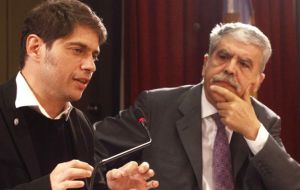MercoPress. South Atlantic News Agency
Argentina begins natural gas and water subsidies reduction in three stages
 “This is everybody’s efforts” insisted minister Kicillof at the presentation
“This is everybody’s efforts” insisted minister Kicillof at the presentation Argentina will cut expensive natural-gas and water subsidies this year which will have an increase impact in utilities' rates between 20% and 80% on average. The gas and water subsidies reduction will reach 80% of top consumers and the accumulative impact will range from the equivalent of 2.5 to 102 dollars, said the Ministry of Economy in a release.
Argentina is struggling with growing deficits that have been financed by inflation-fueling 'raids' on private pensions' funds and the central bank reserves. The country is suffering from double digit inflation with expectations of over 30% for the rest of the year.
“What we are going to do now is reduce subsidies in approximately 20% on gas and water,” Economy Minister Axel Kicillof said during a news conference Thursday. “We are going to provide incentives for responsible use.”
The measures could save between 5 billion and 13 billion pesos (1.6 billion dollars), which would go to cover utility company costs and fund social programs for poor students and children, he said.
Pouring more money into those social programs will increase the purchasing power of lower income families and aid the overall economy, Kicillof said. However the minister said that the reduction will not apply to industries under a promotion scheme in Patagonia and to electricity.
President Cristina Fernandez cabinet chief, Jorge Capitanich, told legislators this month the government aims to gradually halve spending on subsidies such as electricity and natural gas that cost as much as 5% of GDP. Her administration has relied for years on money printing to cover federal deficits arising from heavy spending on social programs and subsidies.
Government officials have repeatedly denied that spending is inflationary, instead they blame rising prices on greedy businessmen. Earlier this year, the central bank devalued the peso and almost doubled interest rates to quash a run on the peso by inflation-wary investors. But tighter monetary policy so far hasn´t been accompanied by fiscal restraint. Instead, the government has capped prices on around 200 common staples to contain inflation.
The new scheme, the Economy minister explained, will allow a surplus to be re-allocated in the Universal Child Allowance and Progresar social programs, the Kirchnerite-sponsored cash transfer the first for low income families on condition their children attend school and receive regular medical checkups and a financial benefit for 18-24 years olds the second who want to finish or begin their school or university studies.
“We stand for the idea of a state that has to be present to improve people’s life conditions but also to create purchase power that underpins the sustained economic growth reached over the past decade,” Axel Kicillof assured and pointed out the industrial sector will be exempt from the new subsidies scheme. But the minister warned the government will “monitor” manufacturers to prevent “disproportionate” tariff hikes or shortage scenarios.
“This is everybody’s efforts,” Kicillof insisted and added the Cristina Fernández administration “is still committed with its subsidies’ policy, to improve Argentineans income and invigorate the domestic market.”
Last week, a report released by the Buenos Aires province Economy Ministry showed the wealthiest 20% of the population nationwide receives 30% of subsidies, while the poorest 20% receives just 12%.
Among those who will not be reached by the 20% cut in gas and water subsides, will be gas cylinder users who still lack the natural gas service and the provinces of Formosa, Chaco, Misiones, Corrientes, the northern area of Entre Ríos, the northern area of Santa Fe and some districts in Santiago del Estero. The new subsidies policy will not include those benefiting from state allowances either.
The “redistribution” of resources will be a three-stage plan to be set in April, June and August. According to what was reported, 55% of households which pay between 2.5 and 5.5 dollars every two months, at the end of the three stages will see the subsidy reduced on average between 2.5 and 9.5 dollars.
The remaining 45% of households which pay the equivalent of 13.75 dollars or higher every two months will have subsidies cut by 33% and 80% at the end of the three stages.
According to Planning Minister Julio De Vido, Argentines pay only 20% of the cost of natural gas with the state picking up the rest of the tab through subsidies. These subsidies on energy alone surged almost 47% on-year to 81 billion pesos in 2013, according to ASAP, a nongovernmental organization that studies public-sector finances.




Top Comments
Disclaimer & comment rules-

-

-

Read all commentsIt's all smoke and mirrors.
Mar 28th, 2014 - 11:24 am 0Subsidies benefit the rich is commonly known. Seems Argentina finally woke up to the fact.
Mar 28th, 2014 - 11:27 am 0They can't print more money and they have run out of places to raid it, so finally they are going to attempt to balance the budget a little more.
Orthodox economic theory is finally permeating BsAs.
Shit! There’s a massive iceberg ahead and it’s been there since the K’s came to rule us.
Mar 28th, 2014 - 12:16 pm 0In fact, it’s been growing with all the money printing TMBOA has done to “balance” the books.
Full speed ahead!
On a pedantic note, the best way of avoiding an impending iceberg collision is to order full speed ahead with the tiller turned away from the ‘berg, thus providing sufficient flow of water over the tiller to ensure steerage way. It was the decision to stop engines and reverse them that did for the Titanic.
Commenting for this story is now closed.
If you have a Facebook account, become a fan and comment on our Facebook Page!